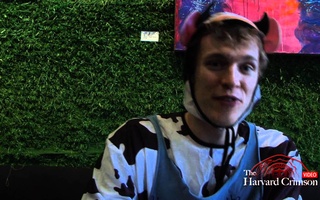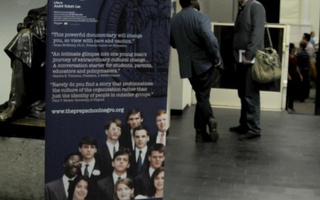
Graham Allison, Director of the Belfer Center for Science and International Affairs and Professor of Government at the Kennedy School, speaks about his newest book, "Lee Kuan Yew" at the Cambridge Forum on Wednesday evening. The book is focused on Lee, founding father of Modern Singapore, and his views on a globalized China.
Lee Kuan Yew was the first Prime Minister of the Republic of Singapore. He has served as a counselor to President Obama and Richard Nixon. Yet, most Americans have no idea who he is.
Harvard Kennedy School professor Graham T. Allison ’62 held a talk Wednesday night at First Parish Church that attempted to familiarize audience members with the man often identified as the Father of Singapore.
“Anyone who cares about the future of international relations has to care about Lee Kuan Yew,” said Allison, who served as Assistant Secretary of Defense during the Clinton administration. “He is the grand master of modern Asian politics.”
Much of the talk, which was organized by the Cambridge Forum, focused on a new book written by Allison and former U.S. ambassador to India Robert D. Blackwill entitled “Lee Kuan Yew: The Grand Master’s Insights on China, the United States, and the World.” The book, which was published in February, deals largely with Lee’s views on 21st century international affairs and specifically U.S.-China relations.
Allison warned the audience that many of Lee’s insights about the United States would leave them feeling uncomfortable.
“Lee Kuan Yew enjoys getting in America’s face,” he said. “He once said that his goal was not to be politically correct, but just correct.”
Many of Lee’s insights, as reported by Allison, were indeed highly critical of American politics and culture.
“Lee believes that the role of money in U.S. politics corrupts the political process here,” he said.
In a phone conversation with The Crimson, Allison also said that Lee would have deemed the current government shutdown to be “a sign of the dysfunction and shortsightedness of American politicians.”
Lee’s views on the broken state of American politics resonated with Germaine Chua, a Singaporean graduate student of regional studies in East Asia.
“Lee’s insights are really astute,” she said. “The government shutdown is an indictment of democracy and how the American system runs.”
Despite these criticisms, however, Allison reported that Lee remains optimistic about the U.S.’s future.
“Lee says that he is impressed with the U.S.’s ability to rebound,” he said.
Allison added that Lee’s thinking about this issue may be influenced by the belief in the importance of achieving a balance of power in international politics between the U.S. and China.
“Lee believes that Singapore needs the U.S. to act as a counterbalance to China,” Allison said. “After all, Singapore could be a small rowboat in a stormy sea.”
Allison has given previous talks to the weekly Cambridge Forum about his work, much of which has focused on nuclear disarmament.
Read more in University News
Faust Criticizes Obama's Financial Aid ProposalRecommended Articles
-
A Modern-Day Treasure HuntOn Saturday afternoon, the Faneuil Hall pub Ned Divine’s was buzzing with the chatter of young couples returning from a ...
-
 Marathon Training, Cow Suit Style
Marathon Training, Cow Suit Style -
 Director Discusses "The Prep School Negro"
Director Discusses "The Prep School Negro" -
Panelists Compare Cuban Missile Crisis to Present-Day Conflict With IranHarvard professors drew on lessons from the 1962 Cuban Missile Crisis, comparing that controversy with the current Iranian nuclear armament program in a panel discussion at the Institute of Politics Friday.
-
Ang Lee Slices Himself an Animated Piece of ‘Pi’"Life of Pi" may herald the beginning of a promising career for lead Suraj Sharma. If not, it at least solidifies Lee’s already established filmography.
-
Donilon Discusses American SecurityThomas E. Donilon, national security advisor to President Barack Obama, disputed the idea that American supremacy is on the decline during a conversation at the Institute of Politics Wednesday evening.













